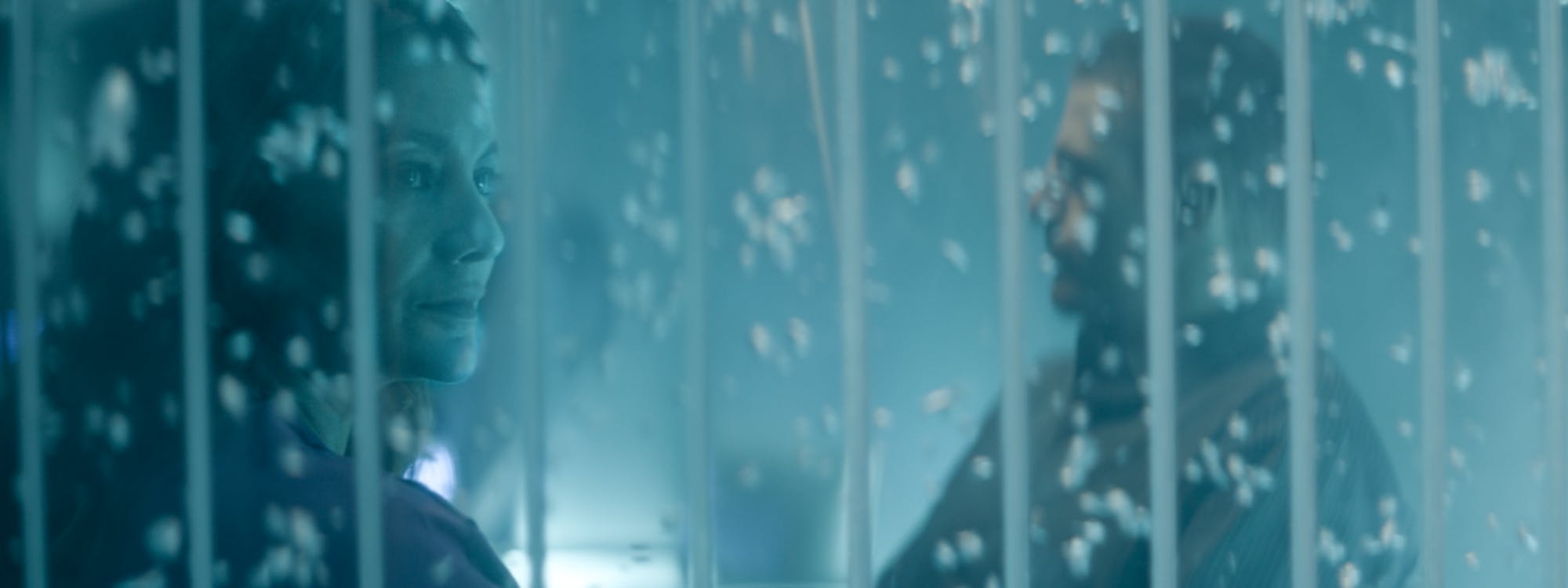Set in 2027, Gabriel Mascaro's “Divine Love” ("Divino Amor") tells the story of a Brazil that has fallen into the grip of a seemingly benign evangelical cult. That, at least, is the premise. In practice, however, the movie has nothing to do with Brazil or evangelicalism. I don't doubt that Mascaro wished to address the evangelical wave that swept the nation following the 2018 election of President Jair Bolsonaro, but the setting and plot of “Divine Love” stray too far from reality to serve as a tangible allegory to contemporary Brazil.
Though Brazilian flags occasionally dot the scenery, there is little else that ties “Divine Love” to any particular locale. The dystopian background fits as well into Georgia as Brazil, and Mascaro certainly does not delve into the more complex cultural factors which might have better defined the national characteristic of his film. As for the religious aspect, the practitioners of the Divine Love cult occasionally spurt out references to Brazilian evangelical practices, such as pop renditions of popular psalms blasting in church radios. Any other form of theocratic Catholicism would fit the mold just as well.
Initial caveats aside, “Divine Love”is a stunning film. The aesthetics are what works best here. Every scene is draped with what seems like a wash of neon. The lighting highlights the cityscapes and bureaucratic settings (which is where the majority of the film takes place) without making them seem too other-worldly, which works well with Mascaro's semi-dystopian landscape. I should mention that this is an extremely graphic film. Aside from a live cesarean section, there is nothing in the vein of gore, but there is very explicit sex. The nudity is at least one level above anything you'll find on Netflix, and the scenes do linger. That being said, Mascaro navigates these moments with enough artistic delicacy to make them relatively watchable — a major testament to his aesthetic sensibility.

The plot holds up well but doesn’t amaze as much as the direction and acting. The film follows Joana (Dira Paes) in 2027 Brazil, which still postures as a secular state, despite most people seeming to have already subscribed to the cult of Divine Love. The cult and its followers value family above all else, believing that that divine salvation relies on the consummation of true love, which results (emphasis on this part) in pregnancy. Joana is no different, abusing her position as a notary to stop couples from divorcing and consequently straying away from Divine Love. However, she herself faces marital problems with husband Danilo (Julio Machado), as the couple’s efforts to have a child have been unsuccessful. As the story progresses, she begins to doubt her faith.
In order to demonstrate the power of the cult, Mascaro throws in several examples of how the nation has incorporated religious practices into day-to-day life. Some are convincing, like drive-through confessionals and pregnancy scanners at the door of every store. Others grossly miss the mark, like the ritual of visiting an orphanage in order to drink the tears of bastard children.
Paes and Machado’s eerie acting perfectly captures that nagging sentiment that something isn't quite right. The actors’ greatest accomplishment is that they don't overdo it. Since Mascaro chose to set his film only seven years in the future, his characters would still need to be recognizable to contemporary audiences. Fortunately, although Joana and Danilo are by no means ordinary, Paes and Machado make them believable. It's a shame that Mascaro didn't trust his actors to carry the story by themselves, instead opting for an intrusive narrative voice-over which tends to drown out his best scenes. Even more damaging, the narrator has the voice of an infant and speaks in a dry monotone so as to purposely incite discomfort. This excruciating and frankly condescending plot device is Mascaro's greatest misstep.

I found the ending of the film sufficiently satisfying. As with most dystopian films, the protagonist’s journey eventually unveils the fundamental hypocrisy of the system. In “Divine Love,” that's as much as we're given. The system remains in place and our protagonist withdraws into obscurity. Right before the conclusion, the infant narrator spouts out the cryptic phrase, "Born without a name, you grow up without fear." I am still not convinced that this postscript means anything at all. It certainly has nothing to do with what I've just watched, which is to say that Mascaro probably didn't know how to tie up his story. That's not really too much of a problem, nor is it very surprising. “Divine Love” is a visual experience; the plot is largely secondary.
Mascaro's greatest strength is his restraint. Streaming services have given us our fair share of dystopian narratives, from “Black Mirror”to “A Handmaid's Tale.” However, whereas those shows rely greatly on the cautionary tale angle, “Divine Love”flourishes through its ambiguity. By the end of the film, I'm not entirely sure whether I can make a clear moral judgment about what I've seen. This sentiment is greatly reinforced by Mascaro's visual aesthetic, which is as inviting as it is disturbing.
Grade: B+







